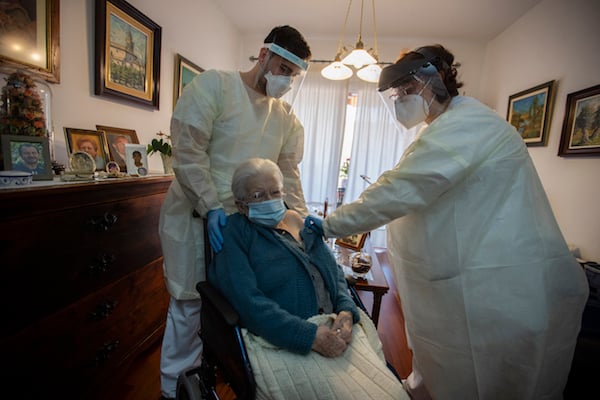Now that the vaccine has be given to the most vulnerable in the Spanish population, Spain can now begin to vaccinate the over 80s in the general population.
Prime Minister Pedro Sanchez said the country was on track to vaccinate 20 million people in the first half of 2021, in line with their summer goal.
Spain has currently given 2.8 million doses of the Covid-19 vaccine and has fully inoculated 1.14 million people.
If the goal is reached in time, it means that Spain will have vaccinated around 42 percent of its population of 47 million population by the middle of 2021.
The news come as a great relief as over 31,000 elderly nursing home residents have died of confirmed ot suspected Covid-19 cases since the start of the pandemic. This is around 47 percent of the total number of deaths from Covid-19 in Spain.
Spain's public prosecutor is currently investigating more than 200 cases of potential criminal mismanagement of the Covid-19 pandemic in nursing and old people's homes.
Now that 97 percent of nursing home residents have been vaccinated across Spain’s 17 regions, according to the FED, it hopefully means that the number of infections in care homes will continue to fall.
Health Emergency Chief Fernando Simon said earlier this week that for the first time since the start of the pandemic, people over 65 who live in care homes have a lower rate of infection than those who live in the general population.
FED’s president Ignacio Fernandez Cid said: “They are very positive data that allow us to be optimistic about the future. Immunity will allow us to gradually return to the longed-for lost normality.”
As well as care home residents, Spain has also been vaccinating healthcare workers and those who need full time carers.
The next lot of Spain's Pfizer-BioNTech and Moderna vaccines will be given to the over 80s, while the AstraZeneca vaccine will be reserved for other key workers under the age of 55, such as teachers, law enforcement officers, firefighters and members of the armed forces.
Healthcare professionals not working in hospitals will also be included in this group, such as pharmacists, physiotherapists, home assistance carers.
With current infection rates in decline, there are now 321 Covid-19 cases per 100,000 inhabitants in Spain, causing several regions to relax their restrictions.
READ ALSO:
- UPDATE: How is Spain's vaccine drive going?
- LATEST: These are updated Covid-19 rules for regions across Spain



 Please whitelist us to continue reading.
Please whitelist us to continue reading.
Member comments